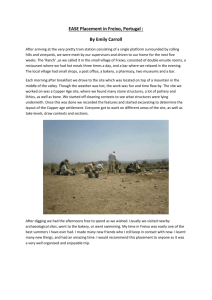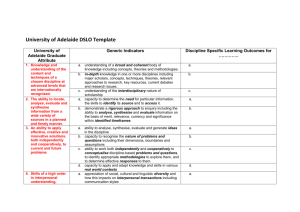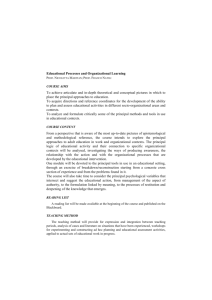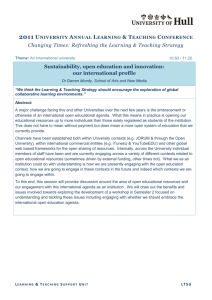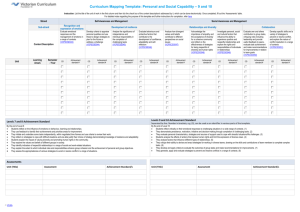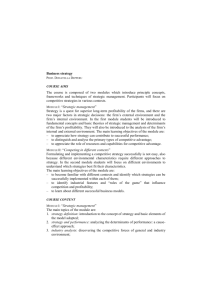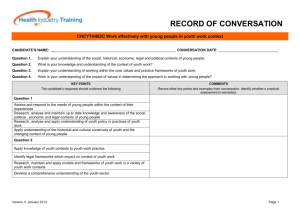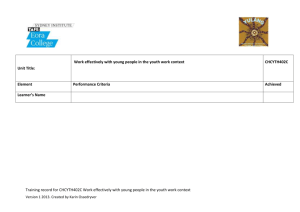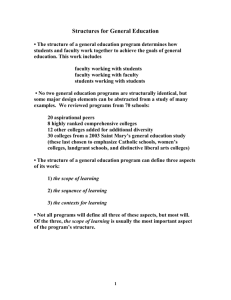MAPPING MMU GRADUATE OUTCOMES THROUGH THE
advertisement
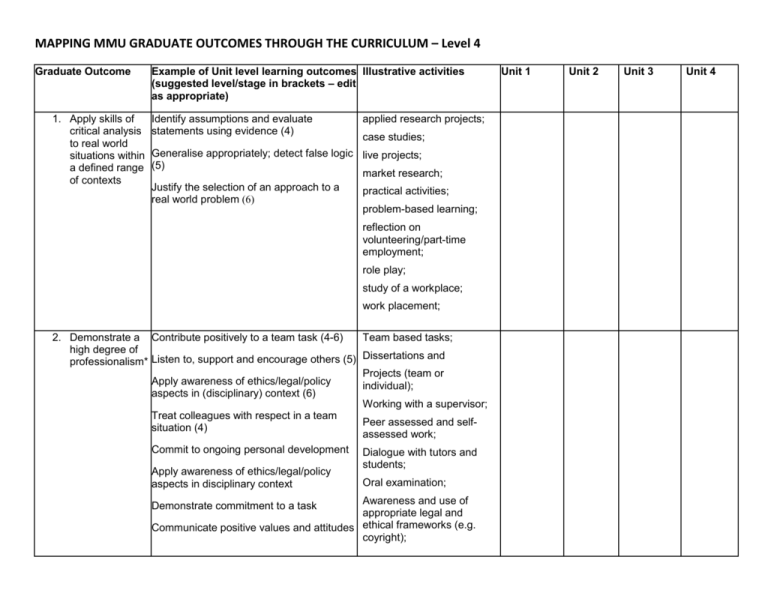
MAPPING MMU GRADUATE OUTCOMES THROUGH THE CURRICULUM – Level 4 Graduate Outcome 1. Apply skills of critical analysis to real world situations within a defined range of contexts Example of Unit level learning outcomes Illustrative activities (suggested level/stage in brackets – edit as appropriate) Identify assumptions and evaluate statements using evidence (4) applied research projects; case studies; Generalise appropriately; detect false logic live projects; (5) market research; Justify the selection of an approach to a practical activities; real world problem (6) problem-based learning; reflection on volunteering/part-time employment; role play; study of a workplace; work placement; 2. Demonstrate a Contribute positively to a team task (4-6) Team based tasks; high degree of Dissertations and professionalism* Listen to, support and encourage others (5) Projects (team or Apply awareness of ethics/legal/policy individual); aspects in (disciplinary) context (6) Working with a supervisor; Treat colleagues with respect in a team Peer assessed and selfsituation (4) assessed work; Commit to ongoing personal development Dialogue with tutors and students; Apply awareness of ethics/legal/policy Oral examination; aspects in disciplinary context Awareness and use of appropriate legal and Communicate positive values and attitudes ethical frameworks (e.g. coyright); Demonstrate commitment to a task Unit 1 Unit 2 Unit 3 Unit 4 Keep to time Follow instructions precisely Deploy skills of fairness, honesty and integrity; 3. Express ideas effectively and communicate information appropriately and accurately using a range of media including ICT, Produce a professional (discipline specific) All assignment types? report (4) Blog; Use appropriate ICT to communicate to a Creation of artefacts; target audience (4) Creative writing; Debate; Construct and pursue a line of argument in Essay; a written form (5) Exhibition; Extended project or Justify a particular viewpoint or course of dissertation; action (6) Film; Moot; Write for a range of purposes (4-6) Oral presentation; Performance; Podcast; Portfolio of visual practice; Poster; Report; Viva/oral examination Web page design 4. Develop working Develop effective team/working/leadership Group work in taught relationships (4) sessions; using teamwork Group assessment; and leadership Reflect on team/leadership roles (5) Reflection on group work; skills, Work across cultural recognising and Recognise and evaluate team members groups; contributions (6) respecting Mentoring or supporting different others; perspectives Volunteering; Placement activity; Personal tutor meetings; 5. Manage their Identify personal strengths and Visits from alumni; professional weaknesses (4) Completion and review of development CV Produce a plan to develop skills (4) reflecting on Exploring evidence-based progress and taking appropriate action Record and evidence personal development approaches to career choice Show commitment to ongoing personal development (6) Interact with careers and employability service Mock interview Personal development planning Reflective practice Visit workplaces Work-related learning Live projects 6. Find, evaluate, Find relevant information using a variety of Evaluate sources of synthesise and print and electronic resources (4) information for their use information authority; from a variety of Evaluate the authority and accuracy of Locate subject specific sources of information (4) sources resources; Provide references to sources of Make appropriate selection information in an accepted format (4) of relevant information from Summarise information from a source or sources (4) Synthesise information from a number of sources (4-6) Interpret/analyse statistical information (45) a range of sources; Put information from sources together demonstrating coherence and using own words; Reference accurately including for web- based and audio-visual material; Use numerical data to support an argument Show academic honesty ; (5) Use library resources Locate subject specific resources (5) including electronic resources such as subject Explain the principles of academic honesty databases, or industry (4-5) reports; Write for a range of purposes; 7. Articulate an awareness of the social and community contexts within their disciplinary field Describe, analyse or evaluate social or community aspects of the discipline (4-6) Describe and exhibit ethical behaviour (in disciplinary context) (5) Justify actions in terms of environmental sustainability (6) Analyse or evaluate social or community aspects of the discipline Engage in and reflect on the contexts experienced while volunteering Reflect on contexts of work experience/placement/study abroad (5/6) Reflect on contexts of work experience/placement/study abroad; Engage in and reflect on the contexts experienced while volunteering (5/6) Reflect on other work based learning Reflect on other work based learning (5) * professionalism may be characterised by attributes such as initiative, creativity, motivation, professional practice and self management. Different emphasis on these will be relevant in different disciplines.
